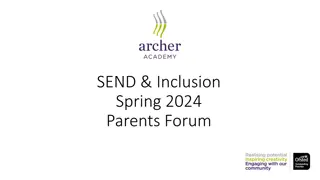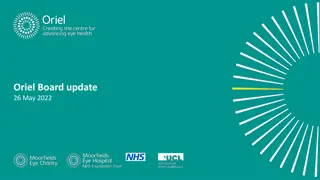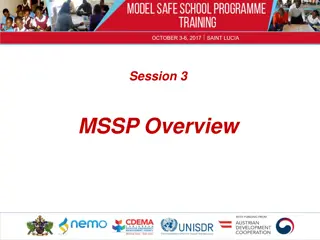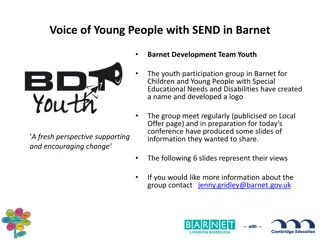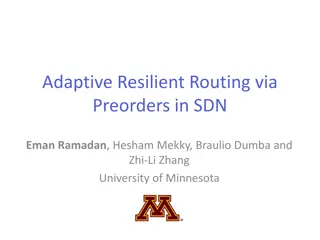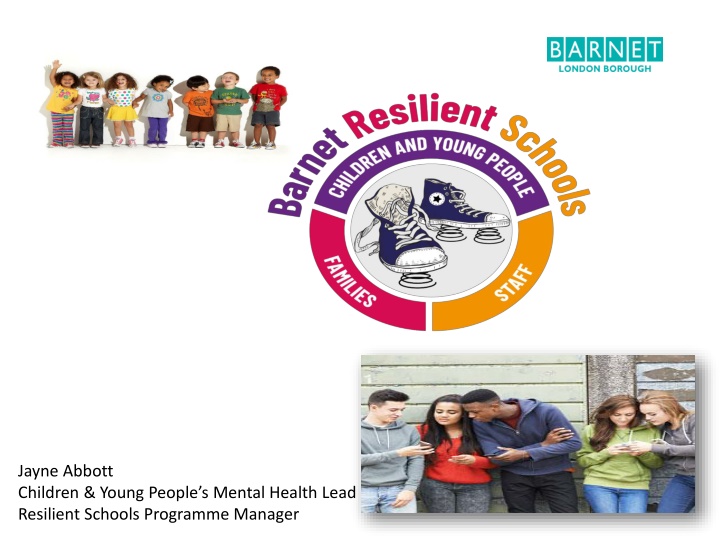
Resilient Schools Programme and Mental Health Support for Children and Young People
Enhance mental health awareness and destigmatize issues through the Resilient Schools Programme. Discover how schools play a vital role in supporting students to develop resilience and maintain mental well-being. Explore the successful implementation and impact of the programme in promoting early intervention and preventing mental health escalation.
Download Presentation

Please find below an Image/Link to download the presentation.
The content on the website is provided AS IS for your information and personal use only. It may not be sold, licensed, or shared on other websites without obtaining consent from the author. If you encounter any issues during the download, it is possible that the publisher has removed the file from their server.
You are allowed to download the files provided on this website for personal or commercial use, subject to the condition that they are used lawfully. All files are the property of their respective owners.
The content on the website is provided AS IS for your information and personal use only. It may not be sold, licensed, or shared on other websites without obtaining consent from the author.
E N D
Presentation Transcript
Jayne Abbott Children & Young People s Mental Health Lead Resilient Schools Programme Manager
The Department for Education (DfE) recognises that: in order to help their pupils succeed; schools have a role to play in supporting them to be resilient and mentally healthy There is good evidence to support this assertion and Ofsted has highlighted that children and young people themselves say that they want to learn more about how to keep themselves emotionally healthy. Moreover, schools have a duty to promote the wellbeing of students.
Resilient Schools 2017 - 2021 Pilot to Universal 80 70 60 50 40 30 20 10 0 2017 2018 2019 2020 2021
Uptake of Resilience Schools Programme 50 Schools 39% 77 Resilient Schools 61% Resilient all schools 6 Special Schools (2 remaining) 15 Secondary Schools (17 remaining) 56 Primary Schools (38 remaining)
Resilience Schools & the Thrive Resilience Schools & the Thrive Model Model Qwell Kooth BICS Resilient Schools Clinical Intervention- CAMHS . IAPT Therapy Services . CAMHS
Barnet Integrated Clinical Service Barnet Education Learning Support Health Schools London Schools CAMHS Suicide Prevention Partnership Inclusion Advisory Teams Partnership Working CYP Mental Health Board Voluntary Section Barnet Safeguarding Partnership Family Services
What is the Barnet Resilient Schools Programme? The Programme Aims To: Raise awareness and de stigmatise mental health Help school communities (pupils, staff, parent and carers to recognise their own and others mental health needs and be confident to seek support for themselves and others. Through awareness be able to intervene early to prevent the escalation of poor mental health
RESILIENT SCHOOLS UNIVERSAL OFFER CORE COMPONENTS Mapping Tool Mental Health First Aider Suicide Prevention Digital Resilience Kooth and Qwell SUPPORT Network Meetings Peer to Peer Support Support through Programme Manager and Health Improvement Officer Resilient Schools website Links to new evidence-based support and resources Resilience in Schools Forum Inclusion Advisory Team Pastoral Forum Barnet Integrated Clinical Services TRAINING Mindfulness Department for Education Return to Wellbeing Physiological First Aid Emotion coaching Unconscious Bias Restorative Justice Zones of Regulation
Evidence that you are a Resilient School that raises awareness and de- stigmatises poor mental health? Will demonstrate all that you are doing Will demonstrate challenges or things you might decide to work on Will play a part in informing future trainings/interventions Mapping Tool Have at least 1 trained MHFA Deliver mental health awareness to pupils Staff training Parent training Mental Health Awareness Posters around the school Staff knowledge of Kooth for signposting Book a presentation Staff know about Qwell Promotion of Kooth and Qwell Self Harm and Suicide Ensure this is in your safeguarding/wellbeing policy Book on Papyrus Suicide Prevention training Digital Resilience Raise awareness of the impact on mental health through signposting to resources
MAPPING TOOL This can underpin, reinforce a Whole School approach not replace it. - - - - Looking at your key strengths Looking at your challenges Using as a reflective piece Enables and formalises the sharing of good practice between schools Curriculum, teaching and learning to promote resilience and support social and emotional learning An ethos and environment that Promotes respect And values diversity Targeted support and Appropriate referral Enabling student voice to influence decisions Leadership and management that supports and champions efforts to promote emotional health and wellbeing on, anger Staff development to support their own wellbeing and that of students Working with parents/carers Identify need and monitoring impact of interventions (Source Public Health England and Children and Young Peoples Mental Health Coalition, 2015)
Identifying Need and Monitoring Impact Key Question: How does the school or college assess the needs of students and the impact of interventions to improve wellbeing? Links with the Ofsted Inspection Framework: When inspecting the quality of leadership in and management of the school Ofsted inspectors should consider the effectiveness of monitoring and evaluation and the extent to which it is shared with governors. They should also consider how well the school meets the needs of all vulnerable groups of pupils. Assessing and responding to the emotional health and wellbeing needs of children and learners, and taking steps to mitigate the impact this has on their capacity to learn could provide supportive evidence in relation to all key judgement areas: the achievement of pupils at the school, the quality of teaching in the school, the behaviour and safety of pupils at the school and the quality of leadership in and management of the school.
Working with Parents/Carers Key Question: How does the school or college work in partnership with parents and carers to promote emotional health and wellbeing? Links with the Ofsted Inspection Framework: . Links with the Ofsted inspection framework: The Ofsted inspection criteria expects schools to be engaging parents in supporting pupils achievement, behaviour and safety and their spiritual, moral, social and cultural development. Ofsted inspectors have a duty to have regard for the views of parents. Inspectors will also take account of the results of any surveys carried out or commissioned by the school
Youth Mental Health First Aid To preserve life where a person may be a danger to themselves or others To provide help to prevent the mental health problems developing into a more serious state To promote the recovery of good mental health To provide comfort to a person experiencing a mental health problem Covering the Mental health problems of: Depression ~ Anxiety ~ Eating Disorders ~ Psychosis ~ Self Harm and Suicide Covering the Mental health Crisis Situations of: Suicidal behaviour/thoughts Panic attack/Acute stress reaction Acute psychotic behaviour
Engagement-Mental Health First Aid 191 Trained Youth Mental Health First Aiders 213 Trained by end of Academic Year (2021/22) 89 schools have at least one Youth Mental Health First Aider
Thought-provoking. I genuinely feel that the course has changed my way of thinking. I realise that you don't know what is going on in people's lives. I shall always try to be kind and tolerant and remember if someone is behaving unusually, there is most likely to be a reason for it. The course was delivered in a very personal yet professional manner. It was discussed in detail to support my understanding and develop my knowledge in this field. Completing this course has enabled me to have the confidence to share my experience and knowledge of this subject with my team and family who live alongside this. It has given me a broader scope in how to support a young person experiencing these issues in their life and to use the correct terminology to support them. It has been hugely beneficial and I am honoured to be part of this community and look forward to making a difference in society. Thank you
Lessons Learnt From Our Pilot Phase - That s many schools address most of the Whole School Approach they just need to demonstrate it and map out gaps. - That schools want to do everything but don t have the capacity. - That schools need recognition for their achievements RS logo. - That a programme works well when it continues to be co produced. - Resilience in Schools Forum support with the key principles of whole school approach. - Youth Mental Health First Aid Training for ALL schools - Pastoral Forum working in partnership with Barnet Integrated Clinical Team - Availability of Programme Manager and Health Improvement Officer when needed - Self Harm and Suicide Document - Development of RS website
Moving into the Universal Offer - Delivery of Mental Health Awareness throughout the school community a commissioned service. - Recognition for Schools using the Resilient Schools Logo - Peer Champions - a commissioned programme for 16+ - Training and support for our Youth Mental Health First Aiders - Continue to work closely with schools to inform future decision making. - Ensure RS continues to align with pathways for mental health in Barnet using the Thrive approach and continues to work in partnership with others. - Looking at evidence/outcomes how do you evidenced that a preventative approach and building of resilience stopped escalation of poor mental health later on??? (quantitive not qualitive)








